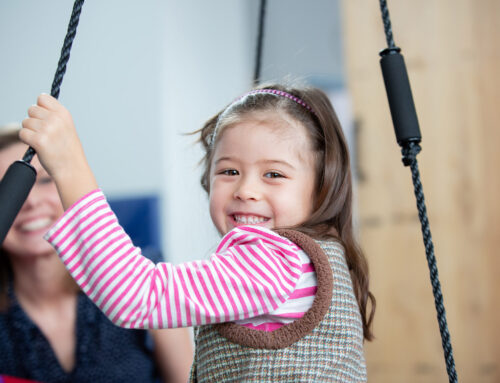How do we know when a child is challenged just enough to grow and learn? It’s often easier to tell when they have been challenged too much. Children may become frustrated, upset, or shut down when an activity is too hard for them. In some situations, children may throw the object or activity that is frustrating them, they may cry out, or may seek help from a trusted loved one. Think about a time you had to learn something new, like driving a car. Were you thrown into it or did you learn it step-by-step? If your driving instructor simply had you sit behind the wheel in rush hour traffic with no previous information or experience, you may be destined for a crash! What helped you grow without stretching you too thin? Hopefully, you could practice steps and build up your knowledge with just enough support and challenge to build your skills and confidence.
When children aren’t challenged enough, they may appear bored, they may take an activity and change it to make it more interesting or challenging, or they may avoid it and seek out something that is more interesting to them. Much like adults, children do not like being bored or feeling like they have been given a task that is too easy or “babyish”. Think about a supervisor or teacher you’ve had who tried to walk you through something basic that you already knew inside and out, did you feel respected or understood?
So how can you find the sweet spot of challenging your child to try something new without overwhelming them? Here are some suggestions and observations to consider:
- Start with an activity your child really likes and finds calming.
- Ask to join their play and play next to or near them.
- How are they responding? Are they watching you? Ignoring you? Pushing you away? Grabbing your toy?
- If they are responding aggressively by pushing or grabbing, it is a sign that they are being too challenged and not ready for that type of play. It is time to step back and observe their play or play quietly with a bit more space between you. When they calm, you can move closer and try again.
- If they are watching you, it may be a sign that they are ready for more interactive play. Ask if you can add to what they are playing, building, painting, etc. Try to join in and take turns with their play.
- If they are ignoring you, keep playing near them and try to move closer to see if they will allow you to join their play more interactively.
- If they remain calm in your joint play, try adding a new element that may be more exciting or challenging which will encourage them to stay focused and play longer. If you are playing trains next to each other, what happens if the trains go under a chair or table? If you are coloring next to each other, could you glue on cotton puffs or glitter? If you are reading stories together, could their favorite stuffed animal or doll read the story?

By engaging your child in a preferred activity, you are helping them to feel calm and open to expanding the play either by including you or trying something new with their toys. This will challenge them to grow skills like taking turns, sharing, focusing on an activity for longer, and sitting still and listening. Think of it like stretching a rubber band. A little bit of stretch is fine and makes use of the rubber band’s skills. However, if you stretch the rubber band too far or too fast, it may break.
If you give your child too many challenges or new activities, they may be overly excited, overwhelmed, or disinterested. This can lead to challenging behaviors like a tantrum, becoming emotionally dysregulated, or wandering away from the activity. This is their rubber band snapping. But, if you start with where your child is at, with what is interesting to them, you can build on their capabilities and expand on their skills. A little bit of a stretch is great; it supports learning and development. Not enough stretch can lead to boredom or undermine confidence. Too much stretch can be overwhelming and frustrating.
If you’d ever like more information about what helps challenge and support your child’s development without breaking their rubber band, just email their social worker and they can offer more individualized information.

Blue Bird Day fosters socialization, sensory regulation, and pre-academic learning in children ages 2-7 years in therapeutic rotations that simulate preschool and kindergarten settings. Our compassionate therapists practice a relationship-based and family-centered approach, provide parent training, and collaborate on goals and individualized intensive treatment plans for your child.
We believe in a collaborative and multi-disciplinary team approach to therapy. A team of occupational therapists, speech-language pathologists, dietitians, developmental therapists, behavioral therapists, physical therapists, and therapeutic assistants are created for each child to ensure child and family are fully supported and the best possible results are achieved.
Options for individualized, group and virtual therapy sessions are available as well.
Want to learn more or you have a specific question? Feel free to connect with us here!



